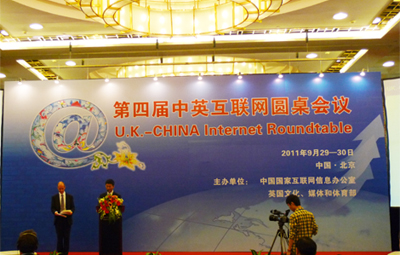Tapping into technology
Updated: 2011-10-07 10:07
By Alexis Hooi (China Daily)
|
|||||||||
|
Intel China managing director Douglas Cougle wants to introduce technology to "change lives." Zou Zhongpin / China Daily |
Intel China offers basic solutions for SME problems in Pearl River Delta
Small- and medium-size enterprises (SMEs) in China are facing "real problems" in their quest to move up the value chain and stay relevant amid tough global challenges, says Douglas Cougle, managing director, Intel China.
But the US-based technology and computer chip giant says that such challenges create "great opportunities" in China.
"Intel's strategy in China is to team up with business partners and customers to develop technology solutions for real problems," Cougle says.
"Intel's focus is on using technology to develop solutions for real needs. It may be things like, 'how do I manage a set of computers?' But it is also all about innovation, as companies need to innovate and find new ways of doing business to move up the chain, rather than just concentrate on manufacturing."
Technology is the best way to achieve these goals, Cougle says. "There are some examples in Guangdong where people have realized the value of being integrated with the global economy and reshaped their business strategies accordingly," he says.
"New business ideas can also be generated with the help of technology. I have just reviewed a wonderful business idea wherein the entire interior decoration of a house can be done on a personal computer with a 4D design . The 4D process is linked to a retail store from which purchases can be made. It's a great idea that enhances creativity and ensures business growth. At the same time it is also a platform that turns business ideas into reality."
Cougle's optimism comes at a time when SMEs in Guangdong province are facing unprecedented economic challenges. Low-cost manufacturing in Guangdong's Pearl River Delta (PRD) region had propelled the province to become one of the country's most prosperous areas and helped make China "the world's factory".
But rising costs of labor and other resources as well as a push for industries to move inland to avoid the vagaries of the global economy and develop the domestic market have created challenges for PRD businesses to stay relevant.
SMEs contribute to 60 percent of China's industrial output and create about 80 percent of the country's jobs, industry figures show. But without the advantage of adequate capital and economies of scale, they have particularly felt the crunch. Authorities have recently refuted claims that SMEs in the province are experiencing bankruptcies and maintained that the overall situation is stable.
Against this backdrop, Cougle says Intel is helping to roll out one particular solution that would be of great help to the SMEs.
"As you go around and as you talk to small and medium businesses, the main problem I hear is, 'in order for us to grow, innovate and move forward, we need access to funding'. At the same time the government has always indicated that it wants to help fund these enterprises," says Cougle, who was recently in Guangzhou, capital of Guangdong province, for the 8th China International SME Fair.
"We are trying to get both of them together in such a way that the risks are manageable. But to make this happen, SMEs need to participate and stay connected to the financial system. We are developing an automated solution that makes it easy for the SMEs to be connected. Intel will also come out with devices that enhance the innovative skills of SMEs."
Intel along with its Chinese partners has launched a "business alliance" that enables SMEs in Guangdong get better access to loans and funds. The alliance developed in association with the Guangdong SME IT & Innovation Service Center, China Minsheng Bank's Guangzhou Branch and bank card group China UnionPay's Guangdong branch relies on a high-tech payment system which links the SMEs to a network in such a way that banks can quickly determine the credit history and business record.
The new system is essentially a payment platform, involving a laptop computer connected to a barcode scanner and credit card reader machine that is wired to a UnionPay bank card payment system and a printer for receipts.
"We had the opportunity to work with some key partners from the government and in the industry side to develop a solution that really addresses one of the key problems for small businesses in China. We are able to create an alliance that helps connect SMEs to the financial system. And once they are connected to the financial system they can get access to funds they desperately need to grow and to innovate," Cougle says.
By linking the SMEs to a financial system, there are business activity records that help banks access the credit history without the need for "handwritten books" and paper-based accounting.
So when the SMEs come and offer "a great business idea and want to expand their business into other areas", lenders can look straight at their credit history and figure it out, Cougle says.
"It's a great opportunity and an easy way to connect people," he says. Cougle hopes the Guangdong pilot project will be rolled out nationally.
"Guangdong's a natural place for us to gauge. It's one of the concentrations where small, medium businesses, particularly private industry, have thrived. Businesses here in China, particularly in Guangdong, are feeling the credit crunch impact," Cougle says.
That is all part of the IT giant becoming more involved in Chinese businesses through its technological know-how, he says.
"Intel is interested in finding other ways for our technology to contribute and solve real problems, whether that be in SMEs, consumers, large enterprises, or back office infrastructure.
"I want people to be excited about what we can do to change people's lives. I just still fundamentally believe that we can introduce technology that changes lives and makes them better. And when we can do that, it's a wonderful thing."
(China Daily 10/07/2011 page6)











